
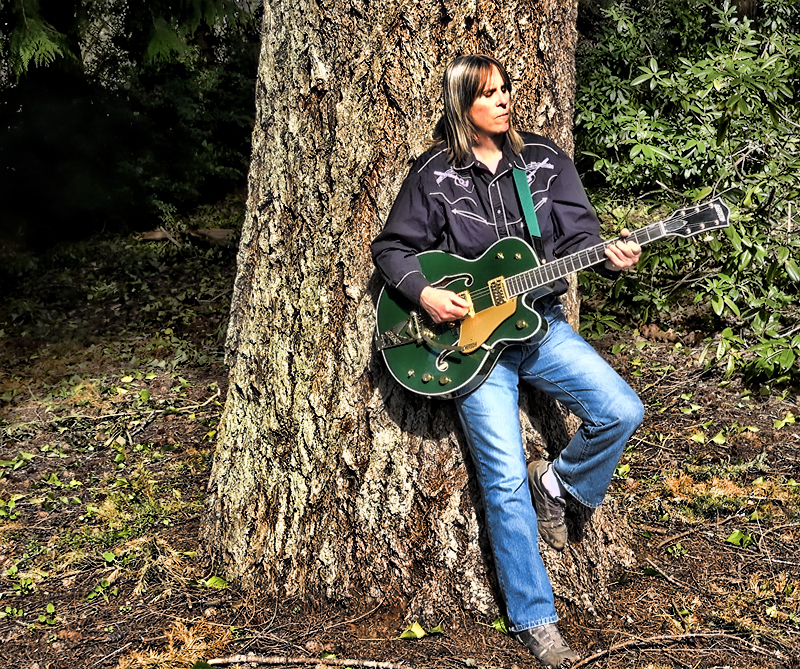 There is a place on the planet where Old Dixie, Cajun country, the Wild West, the northern reach of Latin America and the lingering spirits of long gone wandering Native American tribes collide. It's called Texas. The great state starts in the east along the Gulf Coast and swamps and pine thickets that extend all the way back along the Trail of Tears to Georgia. As you travel the other direction, things change, to say the least. Five hundred miles from the bayous and Spanish moss of Houston and you've reached the southern extension of the great plains. The Llano Estacado it's called, the "staked plains." It's stark countryside, where everything alive has "thorns, horns, teeth or fangs," the saying goes. As for the climate, "the Devil lives in hell because Texas is too hot," and in the winter: "a barbed wire fence is the only thing between here and the North Pole." Before cowboys and cotton farmers and oil wildcatters arrived, only roving bands of Comanche Indians, and, later, a few bedraggled wagon trains, passed through, and they had better sense than to stay long.
There is a place on the planet where Old Dixie, Cajun country, the Wild West, the northern reach of Latin America and the lingering spirits of long gone wandering Native American tribes collide. It's called Texas. The great state starts in the east along the Gulf Coast and swamps and pine thickets that extend all the way back along the Trail of Tears to Georgia. As you travel the other direction, things change, to say the least. Five hundred miles from the bayous and Spanish moss of Houston and you've reached the southern extension of the great plains. The Llano Estacado it's called, the "staked plains." It's stark countryside, where everything alive has "thorns, horns, teeth or fangs," the saying goes. As for the climate, "the Devil lives in hell because Texas is too hot," and in the winter: "a barbed wire fence is the only thing between here and the North Pole." Before cowboys and cotton farmers and oil wildcatters arrived, only roving bands of Comanche Indians, and, later, a few bedraggled wagon trains, passed through, and they had better sense than to stay long.A fifth generation Texan, Rusty Reid was born out here in West Texas and raised on the same sun-burnt caliche that produced such stellar singer-songwriters as Buddy Holly, Roy Orbison, Jim Seals, Larry Gatlin, Joe Ely, Larry Henley, Guy Clark, Butch Hancock, Waylon Jennings, Jimmie Dale Gilmore, Amanda Shires, Delbert McClinton, Jon Dee Graham, Mac Davis, J.D. Souther, among others. For an expanse of cactus and mesquite with more rattlesnakes than people, that's a pretty strong roster. Rusty moves in that tradition. Rusty's mom made sure there was always plenty of music in the home. Her side of the family was quite musical; it seemed everyone played an instrument and/or could belt a tune. She had a diverse record collection that Rusty would play incessantly on their new Magnavox console. "I also was super lucky to have grown up during a true golden age of American popular music," Rusty explains. "We had a fine Top 40 radio station in Midland, KCRS, that played a wide range of hits. That was how it was back then. Pretty much all of America was listening to the same songs. At night, on my little transistor radio, I could bring in 50,000 watt KOMA from Oklahoma City, as well as a powerful station in Juarez, Mexico playing American hits. Radio was not balkanized like it is now. Yes, there are a lot more channels now, and that opens up more opportunities for artists. Yet, we've lost something as a country by no longer sharing our playlist. Back in the 1960s, on any given station, you would hear a wide range of artists, from pop to rock and roll to country to soul to show tunes. The days of 'race records' being banned from mainstream radio were over. You could hear, back-to-back-to-back, Elvis singing 'It's Now or Never' followed by Roy Orbison's 'Only the Lonely' followed by 'The Twist' by Chubby Checker and then 'El Paso' by Marty Robbins, then 'He'll Have To Go' by Jim Reeves, then 'Cathy's Clown' by the Everly Brothers, then 'Walk Don't Run' by the Ventures, 'Handy Man' by Jimmy Jones, 'Sink the Bismark' by Johnny Horton, 'Everybody's Somebody's Fool' by Connie Francis, 'Save the Last Dance for Me,' the Drifters, 'Chain Gang' by Sam Cooke, 'Harbor Lights' by the Platters, 'Walking to New Orleans' by Fats Domino, 'Georgia on My Mind' by Ray Charles, 'I Want to Be Wanted' by Brenda Lee, 'Stay' by Maurice Williams, 'Money' by Barrett Strong. All these songs came out in 1960. It just blows my mind to think on the voices and melodies that danced across the airwaves back then that everybody was grooving to. And it would only get more amazing as the Sixties fully emerged." One day in early 1964, Rusty's mom came home from work with a new album with a strange title, "Meet the Beatles," later claiming it was the worst mistake of her life. As with so many American boys of that "British Invasion" era, Rusty's life was changed forever. "I wanna do that!" 11-year old Rusty proclaimed. After a few years of childhood piano lessons, having met the Beatles, Rusty switched to the guitar, first on a cheap Stella, then on a 1938 Gibson handed down from his singing cowboy uncle. It didn't take long for Rusty to want an electric guitar, the first being a Silvertone 1450 out of the Sears catalogue and a tiny Airline amp from Montgomery Ward. Rusty started writing original songs about the same time. That effort was helped along when he finally got a higher quality guitar, a 1968 Gibson Southern Jumbo acoustic. Like most other West Texas songwriters, Rusty dreamed of exchanging tumbleweed country for verdant landscapes, towns for big cities, wide open spaces for wider opportunities. After high school graduation, following an intermediate summer in Austin (which was not, at the time, the music hotspot it would soon become), he made a bee-line for the biggest city in Texas, Houston. He had left the Old West and gone to Dixie. A year and a half at the University of Houston proved daunting. Rusty's mind was on music, not studies, so after his third semester, with no particular concurrence from anyone else, Rusty decided he was ready for Nashville. In the cold winter of his 19th year, he packed up his '66 Chevelle with a change of clothes, stereo system, two guitars (the Gibson acoustic and an electric Gretsch Country Gentleman) and drove to Memphis, paying his respects to Beale Street and Graceland, then on to Music City. At first it seemed a charmed decision. He met with famed guitarist Chet Atkins within hours of arrival, and found quick, initial success, signed as a staff songwriter for prestigious Peer-Southerm Music Publishing. Peer provided the opportunity of recording some of his songs in legendary RCA Studio B. "See, this is easy," he wrote home to his worried parents. But the fast start was ephemeral; it was a naive and premature move, though not without its experiential value. Anyway, that early material was sub-par, as well as too rock and pop influenced for the direction Nashville was enamored with at the time (this being before Nashville was as friendly with other genres as it is now). "Your style is more L.A.," became the consensus.
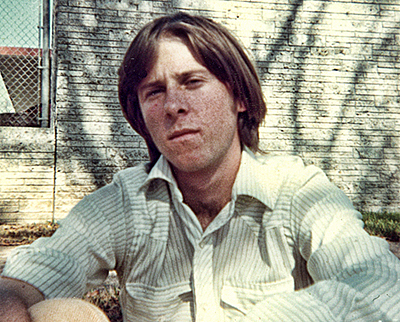 Nashville songwriter, 19 years old, 1972.
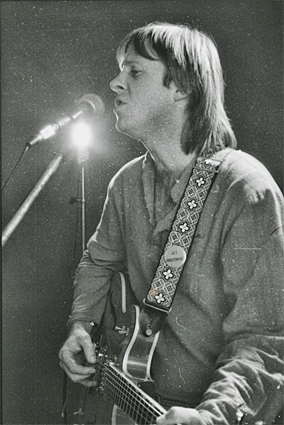 Houston, early 1980s.
In the Fall of 1973, Rusty headed back to college in Houston, eventually earning his B.A. degree. He would put his degree in communications to work, making money working for the public relations departments of the Houston Hurricane professional soccer team, then with the Houston Oilers pro football organization, and by writing articles for local and regional publications. It was fun and exciting and sometimes, with the investigative journalism, was important work. But Rusty's mind was still on music. In Houston he played in several bands, and continued working on song crafting and finally, after a decade of practicing, came up with some numbers he still likes today. "I came of age as a songwriter in those post L.A. years in Houston," Rusty says. "I was really a rank beginner in '72 when I went to Nashville and Los Angeles. But back in Houston I finally got my act together and figured it out. I loved being in Houston, and thoroughly enjoyed the local music scene. There was a lot of talent there, many acts much further along than me. But it was noticeable, and disappointing, that only a scant few who deserved were making it nationally." With not enough happening fast enough, musically, in Houston, Rusty heard the siren call of Los Angeles once again, and relocated in May of 1984, determined to not make the same mistakes this time around. He settled near the beach and got busy... not doing music. It turns out Rusty didn't make the same mistakes in L.A. the second time around; he made different mistakes. Whereas, the first go-round found him wiping windshields and changing tires at a gas station in the Valley, in City of Dreams Chapter Two, he was hanging out at the beach and landed what would surely be the typical American guy's dream job: writing and editing sports publications for the largest magazine publisher on the West Coast, with the requirement of having to attend the World Series and Super Bowl each year. Yep, somebody had to do it. It was a glorious state of affairs... for a while. Rusty's mind was not on music.
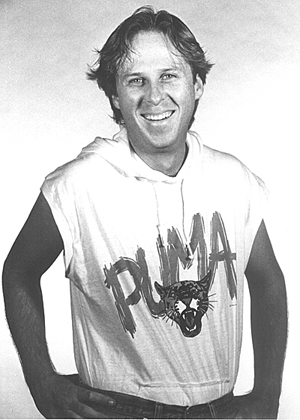 L.A. sports magazine writer/editor, 1987.
His diminishing regard for his "dream" career in sports writing was reflected most visibly by his hair getting longer, a not so subtle freak flag flying in the face of his staid working milieu (this was prior to the players, themselves, embracing flowing locks and dreds). The only redeeming factor of the ongoing job was the travel, where Rusty soaked up the local flavors, history, geography and culture of sports venues from Hawaii to the Florida Keys, from the Great Smoky Mountains to the bustles of Chicago and New York City. One trip eventually placed him at the third game of the 1989 World Series at Candlestick Park during the Loma Prieta earthquake. No serious journalist could retreat from that scene. As Rusty wandered and pondered the wrecked town over the next few days, two of Rusty's important songs were inspired: "Earthquake City," and "Key to the City."
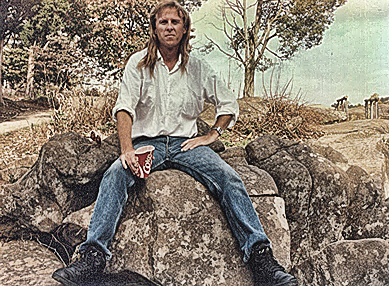 Devil's Den, Gettysburg, 1990.
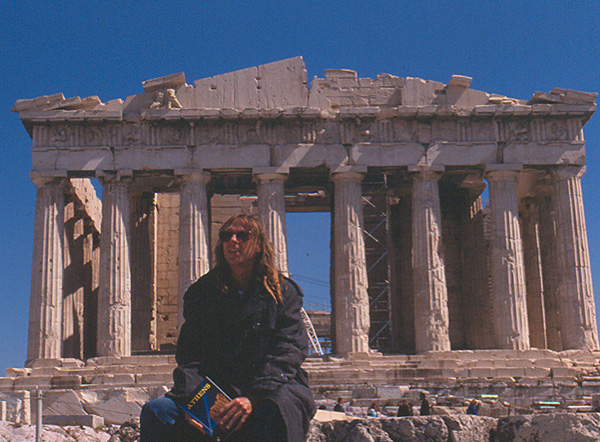 The Acropolis, Athens, 1990.
Bored with the sports business and with L.A. (can you imagine?), Rusty wanted to be some place more organic, more real, some place with seasons, some place where the trees and shrubs weren't from Japan or Australia, a place where not everybody was an aspiring actor, model, singer or songwriter. In 1995, after 11 years in Los Angeles, Rusty piled his belongings plus four goldfish, three chinchillas and three parrots into a van, his Honda sedan towed behind, and made the 1,100 mile trip north up Interstate 5 to the Puget Sound. In the move, Rusty traded one "Earthquake City" for another, but also one music city for another. Rusty settled outside of town in an idyllic spot on the waterfront. It was a year or so after Grunge had died, nevertheless, the Seattle-Tacoma area remained a vibrant place for live and original music. The plan was to tap into that energy. As ever, distractions had other intentions. Just making a living was all consuming. The music would have to wait. And so it did until the dawn of the new millennium when Rusty finally released his first album, NWXSW (Northwest by Southwest). 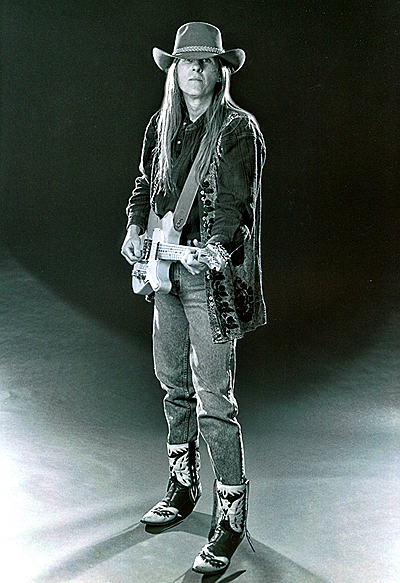 NWXSW Photo Shoot, Seattle, 2001.
Three and a half months later, Rusty's father would pass away, this following the death of his grandmother a year before. "All told it was a load of bricks," Rusty says. "I felt stunned, stymied. I just wanted to crawl into a hole. I dropped the ball on the album, never listed it on iTunes or Amazon, which were both newly minted online music sales venues. There was no Spotify or Pandora back then. I never even considered getting a band together to promote it, or even go out solo. It all just seemed useless, hopeless. I would be turning 50 soon. I had to face the facts. I had missed my shot." Nearly 13 years would pass before Rusty finally regained his musical footing, switching from analog to digital recording, and setting his songwriting skills to the challenge of capturing the ideas that had been swirling in his head since the world trip. Songs began flowing in early 2014, and recording in earnest of his next album, to be titled Head to Heart began in 2015. 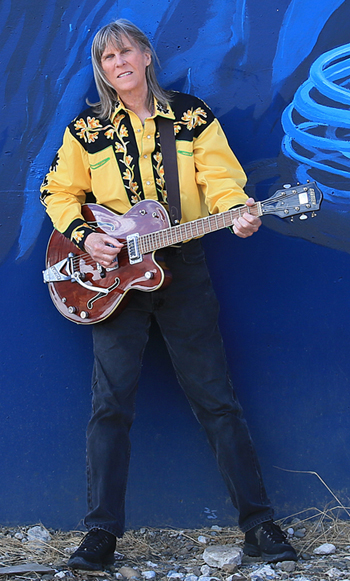 Head to Heart Photo Shoot.
In 2019, Head to Heart is released, accompanied by videos for "Eldorado" and "Dismaland." The album is nothing less than a revolutionary manifesto in song. It didn't take Rusty another twenty years to release more music. Two singles, "American Villain" and "The United States of Selfishness" were released in 2020, another single "Shelter" was released in 2021. His third album, "Bayou Line" was released in 2023. A remix of "Head to Heart" was released in 2024, while 2025 saw the release of his fourth album, "The Unreasonables." In 2026 due out is "Lone Stardust: Masterworks of Texas Songwriters." And more originals are on the near horizon. Rusty is still in reasonably good shape for an authentic child of the 60s, one who never lost the idealism and revolutionary spirit that decade is remembered for. Indeed, the Spirit of 1967, not to mention 1776, still lives in this eco-evo-revo spiritual philosopher of a songwriter. "I don't know what will happen with this music," Rusty says of any unlikely success at this age. "At any rate I did all of this for me. Any artist has to do their art, first and foremost, for themself, and that should be enough. If others like it or are moved or inspired or informed or provoked or disturbed by it, that's good; any financial gain is a plus. But if you are an honest artist, you know better than anyone if you succeeded or failed or hit somewhere in between. And even if you judge the project a failure, you still learn something through the process and, hopefully, get better. At least you tried. At least you had the courage to put yourself out there. You risked your vulnerability. In the end, my real 'art project' has been myself. That's actually true for everyone, though most never even realize it. I'm still trying to get that project right. These songs are just my bangles." This is part of the story. There is much more. But that's a different tale for a different time.
|
© Copyright Rio Paso Music Productions

